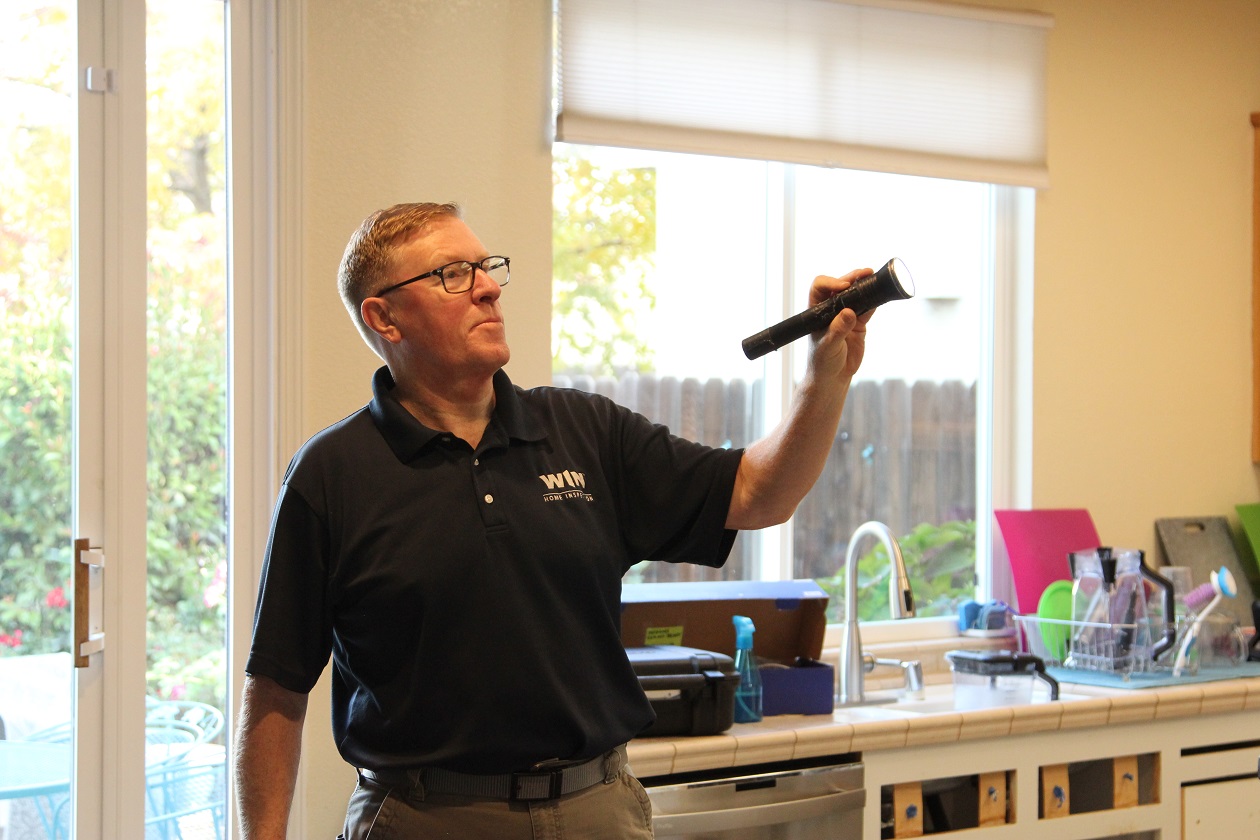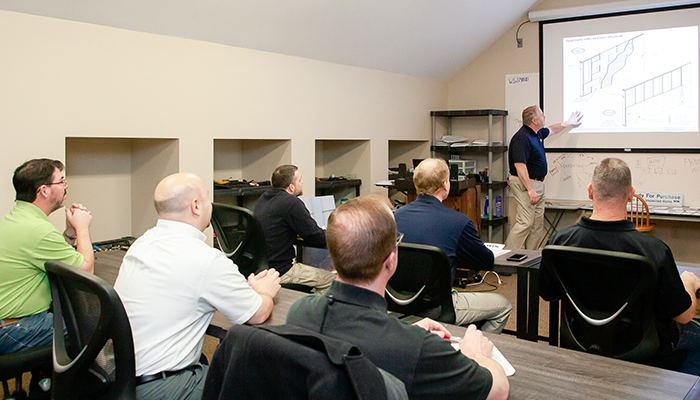Ready to Embark on an Exciting Journey with WIN?
Take the first step toward personal and financial freedom by filling out the interest form. One of our franchise advocates will be in touch with you soon!

Thinking about becoming a home inspector? Good choice! It’s not just a job—it’s a chance to really dive into what makes a house a home and help people make a sound decision when it comes to the greatest investment they’ll ever make. But becoming a home inspector doesn’t happen overnight. Whether you’re fresh out of school or looking for a career change, knowing how long it takes and what you need to do is key.
So, how long does it take to become a home inspector? It could be a few months to over a year, depending on a bunch of factors. This journey’s more than just checking off items on a list—it’s about building up your know-how and skills in a big way. Ready to dive in and find out what becoming a home inspector is all about? Let’s get to it!

Home inspectors are the unsung heroes of the real estate process. They’re the ones who examine every inch of a property, from the roof to the basement—and everything in between. Their job is to spot potential issues and raise safety concerns, providing detailed reports that help buyers make informed decisions and budget for any future repairs. But their expertise doesn’t stop with just the inspection. Home inspectors also offer a range of additional services, like mold testing and air quality assessments, which makes them incredibly valuable at any stage of homeownership.
» See: What Does a Home Inspector Do?
One of the biggest factors that will determine how long it takes you to become a home inspector is the state where you plan to do inspections. State regulations vary widely, and these regulations will dictate the required training, exams and licensing procedures you’ll need to complete.
In states with rigorous licensing requirements, the path to becoming a home inspector is more structured and can take a bit longer. You might need to complete an approved training program, gain hands-on field experience and pass both state-specific and national exams. Texas, for example, requires aspiring inspectors to complete a comprehensive program that includes classroom education, fieldwork and passing the National Home Inspector Examination (NHIE), along with additional state exams. This process can take months or longer, depending on how quickly you progress through the requirements. Joining a dedicated training program or franchise system that helps you navigate the licensing process is important in ensuring your success to become a home inspector.
On the other end of the spectrum, some states have minimal or even no formal licensing requirements for becoming a home inspector. In these states, the journey to certification is much quicker. You might only need to complete a few days of training and pass a certification exam. For instance, in California, there’s no state-mandated licensing for home inspectors, which means you can transition into the profession faster. However, even in these states, investing in comprehensive training is a smart move to enhance your credibility and skillset, making your business more attractive to potential clients.
Since the rules for becoming a home inspector can vary a lot from one state to another, it’s important to look into the specific regulations where you live. Getting a handle on these requirements will help you avoid any unexpected roadblocks and smooth out your journey to certification. Think of it like using a GPS—you need the right coordinates and directions to get where you’re going without any detours.

Your training schedule plays a significant role in how long it will take you to become a home inspector. Whether you decide to pursue full-time or part-time training will directly impact the speed at which you complete the necessary education.
– Full-Time vs. Part-Time Training: If you can commit to full-time training, do it. You’ll generally complete your courses more quickly, possibly in a matter of weeks. However, if you need to juggle other responsibilities, like a current job or family commitments, part-time training might be more realistic. This route will take longer but offers the flexibility to balance your studies with your life.
– Flexibility of Training Programs: Most home inspector training programs are designed to be flexible, which is a huge advantage. Whether you’re an early bird or a night owl, you can adapt your studies to your schedule. This flexibility allows you to progress at a pace that suits your personal and professional commitments, making it easier to manage your time effectively.
The type of training you choose will also influence how long it takes to become a home inspector. Each training format offers different benefits, so it’s worth considering which one best fits your learning style and schedule.
In-person, instructor-led courses provide an organized learning environment where you can interact directly with instructors and peers. This format is great for those who thrive on engagement and real-time feedback. If you’re someone who learns best by asking questions and participating in discussions, live classroom training could be the perfect fit.
Live classroom training programs can vary in length, ranging from a few days to several weeks, depending on state requirements and the intensity of the course. While this option might require a more significant time commitment upfront, it can provide a solid foundation of knowledge in a shorter time frame.
Online courses offer the flexibility to learn at your own pace, making them ideal for those with busy schedules or other commitments. You can study whenever and wherever it suits you, which is perfect if you need to fit your training around a busy job or family life.
The duration of online learning can vary significantly depending on your individual time commitment and schedule. Some may complete the course quickly, while others might take longer – the key is staying disciplined and motivated, since your progress is in your hands.
Field training is a critical component of becoming a home inspector. It’s where theory meets practice, providing you with the on-the-ground experience that is essential for developing practical skills. You’ll learn how to conduct inspections, identify issues and interact with clients in real-world scenarios. Aspiring inspectors often need supervision from a licensed mentor, who may either accompany them on-site or check in remotely. In any case, this process is essential to many states’ certification pathways.
The time required for field training can vary but typically ranges from a few weeks to several months, depending on state requirements and the training program selected. This experience is invaluable, as it builds your confidence and competence in real-world settings, preparing you for success in your new career.

After completing your training, the next step is to prepare for the necessary certification exams. This is where all your hard work comes together, and it’s your chance to prove your knowledge and skills.
The NHIE is a comprehensive exam that is required in many states for licensure. It covers a wide range of topics related to home inspection, from structural components to electrical systems and much more, and is a key milestone in becoming a certified home inspector. Think of it as the final obstacle in your home inspector training. Conquer it, and you’re well on your way.
The time needed to prepare for the NHIE can vary based on your prior knowledge and experience. On average, candidates spend several weeks to a few months studying. Utilizing resources like prep courses, practice exams and study guides can help you feel confident and ready when exam day arrives.
» See: Tips to Help You Pass the National Home Inspector Exam
Some states require additional exams beyond the NHIE, which can add to the overall timeline. These exams often focus on state-specific regulations and standards, ensuring that you’re well-versed in the rules that apply to your local area.
To prepare for state-specific exams, take advantage of available resources such as state-specific study guides, online prep courses, and practice exams. These tools can provide targeted knowledge to help you pass with flying colors.
Other factors that could influence your timeline include background checks, acquirement of insurance and application processing time. These steps are often mandatory and can add a few weeks to several months to the process, depending on state and local requirements. It’s important to factor in these elements when planning your journey to becoming a home inspector.
Beyond the formal requirements, personal factors can also impact how long it takes to become a home inspector. After all, class schedules and state mandates aren’t the only inputs that determine the time frame for certification.
If you have experience in related fields like construction or real estate, you may find that you can complete the certification process more quickly. Your existing knowledge and skills can give you a head start, allowing you to focus more on the areas where you need additional learning.
Your personal learning style and discipline will also play a significant role in how quickly you progress through training and certification. Those who are self-motivated and disciplined may move through the process faster, while others might need more time to absorb the material. It’s all about finding the right balance and staying committed to your long-term ambitions.
Becoming a home inspector is definitely a journey – it takes time, commitment, and a passion for technical details. How long it takes can really vary, depending on your state’s licensing requirements, your training choices, and your own personal schedule. By understanding these factors and planning ahead, you’re paving the way for a successful career as a home inspector! Every step forward is a step toward making a meaningful impact, helping people find and keep their dream homes.
With WIN Home Inspection by your side, you’ll receive support at every point—from comprehensive training to navigating the licensing process—ensuring your path to success is smooth and rewarding. To learn more, please fill out the interest form, and one of our franchise advocates will reach out to you.